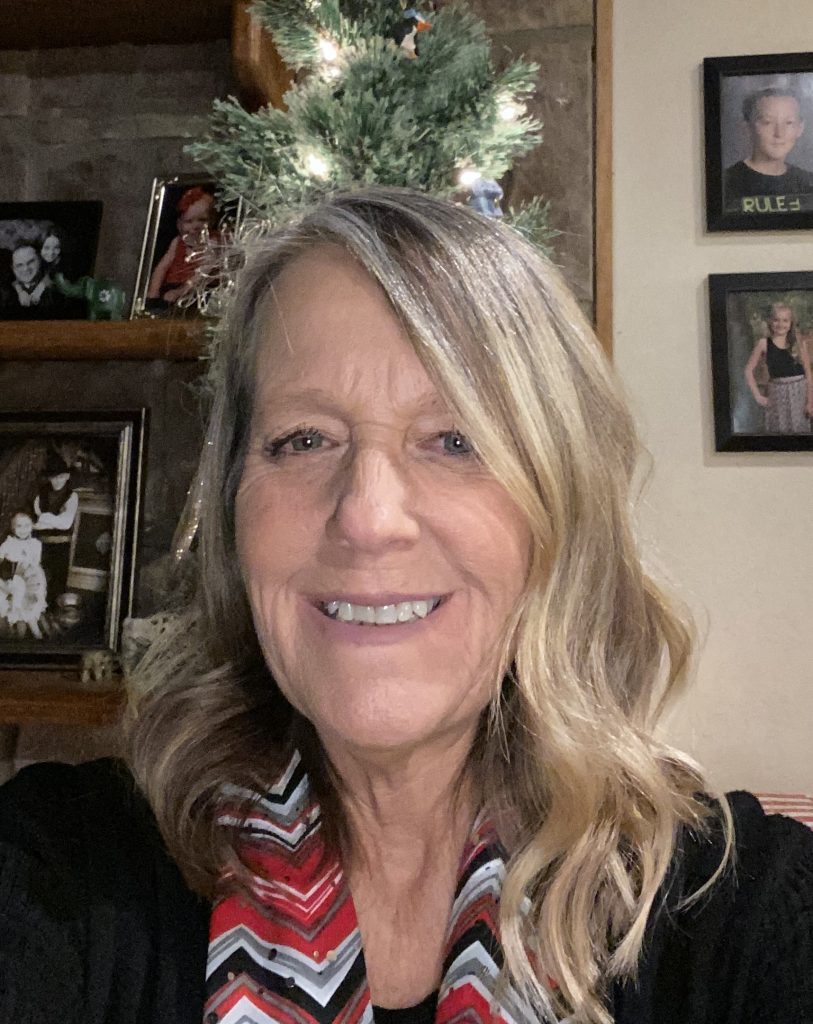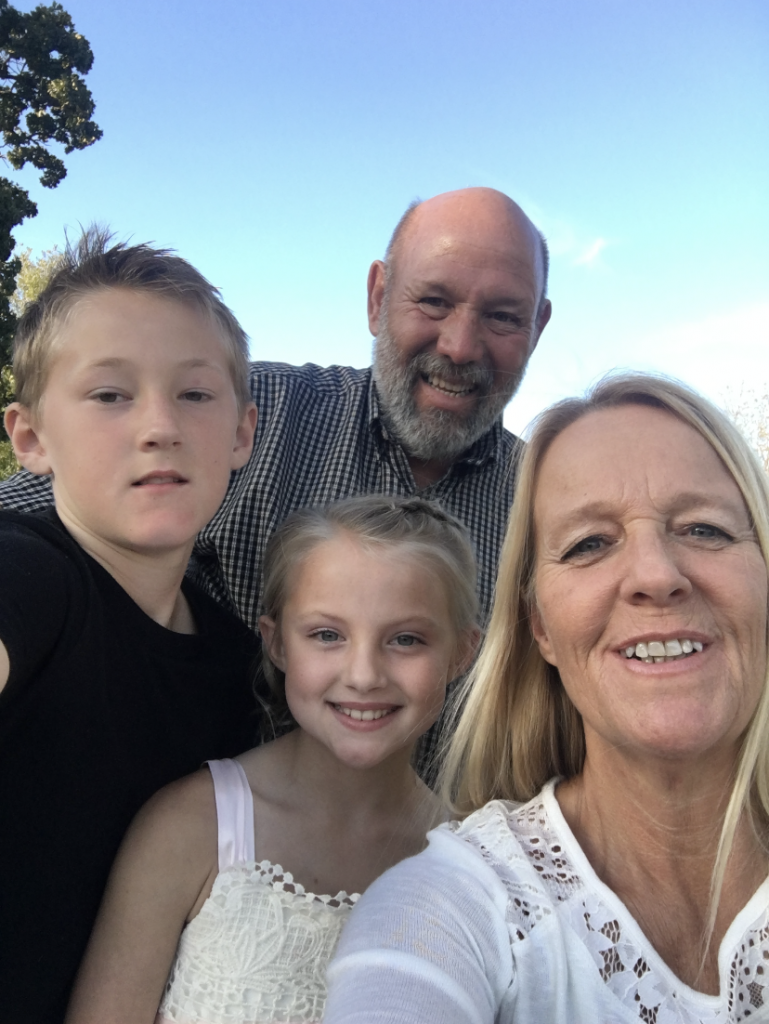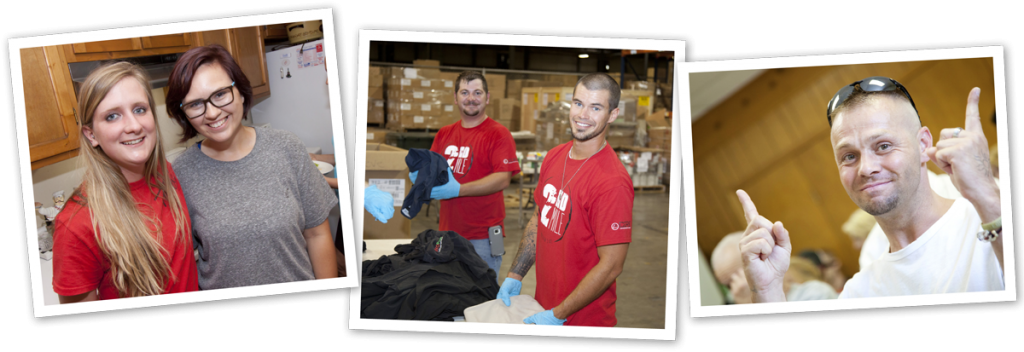A Talk with Tami McKinney

Tami McKinney is an extraordinary person with a blessed heart. She brightens our program wherever she’s found – which seemingly is everywhere.
Her proper job title is Human Resources Manager, for which she plans, coordinates, and directs many of our administrative functions. In practice Tami does a lot more. You may find her leading clients in morning prayer, for example, or participating in an executive committee meeting, or even keeping minutes at a Board of Directors meeting. In fact, people seeking answers to questions regularly end up in her office. Tami is wealth of information. Thus, if there is truly a human institution within our sprawling organization, she may well be that person.
She’s hardly the same person who first came through our doors more than sixteen years ago. In fact, during the autumn of 2004, Tami sat in a plain, cheerless prison cell. The young mother of three was doing time – an intensive “one-twenty.” There alone, in her darkest and sickest of hours, Tami was haunted by guilt and shame. The drugs had long worn off, leaving her with only memories of a life that seemingly had all gone wrong. She never imagined that for herself, even in her worst nightmares.
Tami grew up in an ordinary, single parent home. Her mother and father divorced when she was four years old. “My mom was a single mom raising three kids by herself. She did the best she could, but I was pretty wild.” She was eleven the first time she drank. Amused by Tami’s childish enthusiasm, a babysitter offered her whiskey, and Tami got drunk. She vividly remembers throwing up all over the floor. “But it was fun,” she adds, “and I got a lot of attention.” She tried marijuana under similar circumstances. From these initial experiences her use progressed. By the time she got to high school, Tami was drinking and smoking pot with her friends at every opportunity.
During her testimony, we observed that Tami arranged events around the three significant men in her life. There was her first husband, with whom she had three children. He was an alcoholic who died in his addiction. Then there was a longtime boyfriend and drug supplier. Finally, there is Jim McKinney. Tami and Jim ran together before both getting clean. Three years after recovering, they married. Jim became a valued employee at our Learning Center for Children, and he later acted as our program manager in Springfield before retiring from CORE.
As to drugs of choice, she named three main substances: alcohol, cocaine, and methamphetamines. These substances came and went during the relationships identified above, and her experiences with each sound familiar. The focal point of her drug career was methamphetamines.
Tami not only liked how she felt under the influence of meth, but it also seemed like the way to get things done. She described it as “Me up running around the house, cleaning, getting everything done that I want to do, and getting all ready to go out or to a friend’s house. But I’ve got to do more and more all day long. Every hour was good, at least.” Whenever things got out of hand, Tami tried to moderate her use. She would plan to limit herself to weekends and stopping by Sunday evening so she could get rest and go to work in the morning. That plan was short-lived, every time. “I’d feel really tired, so I’d have to do more. Before you know it, it was every day. At some point I’d stay up every night. I was a mess the next day.”
Like so many addicts and alcoholics, the great fear of Tami’s life became running out of meth. Actually running out, however, “was absolutely horrendous,” she says, “I’d want to kill someone, or myself. I’d just as soon be dead. I couldn’t live without it. I remember times when I couldn’t even get out of bed. Severe depression – I felt like I was going to die until I got more. It was horrible.” Nothing else was more important to her than “finding meth, doing meth, and doing whatever I had to do to get meth. Nothing else mattered.”
During her testimony Tami recalled her many, sporadic personal efforts to keep it together, all of which failed. Her decades of use were plagued by one crushing disappointment after the next. There were the losses of promising jobs, continually moving from house to house and from one town to the next, taking advantage of people trying to be helpful, and her heartbreak with her children. In fact, she remembers her fitness as a mother weighing more heavily on her than anything else. When family, in-laws, and friends weren’t called, the children simply weren’t properly attended. Tami reflects “I only talked a good game, like, my kids were so much more important. But, no. And that’s not anybody I ever wanted to be, and I hated myself for it. I hated myself for doing that to them. I was only teaching them to get high.”
Eventually the law caught up with Tami and Jim, too, who by then had become the man in her life. Jim decided it was time to get clean. Tami had other ideas. After getting out of jail, she went back to the dope house. She also ignored her probation officer. Her attempts at getting clean came to nothing.
She specifically recounts having a court date on September 8, 2004, while having never reported to her probation officer. “I don’t even know why even I went,” she said, “I’d already run for 10 months – why was I even going to court that day? They were going to send me to prison. And that’s exactly what happened.”
All of which brings us back to the autumn of 2004, with young Tami sitting in her prison cell thinking thoughts that were too catastrophic to bear. The wasted years, the lost jobs, abandoning her loved ones. There was no way to put a bright face on it. She cried. There in prison, the full weight of her guilt came to bear, and she asked herself, “What kind of mother does this?” Tami also was afraid of what would happen when it came time for her to leave. She knew that she couldn’t rely on herself. She reached out to knowledgeable people, who first referred her to rehab and, second, to CORE. At CORE Tami blossomed into the woman God intended her to be.
Once here she surrounded herself with encouraging women in the program who kept her going to meetings, volunteering for worthy causes and, most importantly, working the 12 Steps. Tami did get hung up on the fourth step – to the point of still processing for over a month after writing it. A friend coaxed her forward with warnings of disaster if she didn’t get that step done. She knew that, of course, but she was still hesitant to share what happened with her children to anybody. To her relief Tami’s fifth step partner did not judge her. To the contrary, the most common reactions were “I did that” and “Did that too.”
Tami was transforming, the fact of which became apparent to those around her before she saw it herself. “But they would say, there’s something different about you,” she remembers. The obsession was gone. She was relying on God now, and her self-worth was returning. “I let guilt and shame and fear go. If I hadn’t had that outlet by working the steps, I would have been back out there. It was too painful to keep feeling that way. The steps are an amazing thing.”

Tami also began making amends and reconciled with her parents, children, and loved ones. She was particularly grateful to visit her father, who she hadn’t seen in seven years. He’d been a ‘week-in the-summer’ and Christmas kind of dad when Tami was young, but she always loved him and was overjoyed to rekindle their relationship. He got sick shortly thereafter, sadly. “It happened so fast,” she says, “but he got to see me sober before he died.” Her relationship with her mom returned too, and today they are best friends who maintain daily contact. In 2008, Tami and Jim got married; they have shared more than thirteen happy years together.
More recently, Tami’s oldest son had two children, who are Tami’s pride and joy. “God gave me a second chance with them,” and she thanks Him for it. Tami’s actively involved in their lives. We know them, too, and they are great kids.
Additionally, with more time comes more responsibility. Tami was initially asked to work with incoming clients. After commencing she became a CORE staff member. One long-time responsibility that she still looks forward to is leading morning prayer. She likes “to hear the new people pray for the first time. They’ll sit there silent. All of a sudden they’re like, I’ll pray. They pray and it’s music to the ears. It’s the most beautiful thing to hear.”
Tami tells us that she can’t imagine a better job in the world than CORE (we completely agree). In her own words:
We get to see miracles all the time around here. The commencements are my favorite part of the job. I cry at every one. It’s so amazing to see parents speak about their child and how grateful they are. Or their kids getting up there and thanking CORE for giving them their parent back. It’s a miracle, and it’s amazing. There’s nothing like it in the world. I don’t even know how to describe it, but I love seeing them.
In addition to commencements, Tami also shared memories of other best days at CORE. Her answer caught us off guard because there isn’t a particular day or a special event. Rather, they are every day, she tells us, “when we’re together, enjoying life and each other’s company in sobriety. Sometimes I look around and see staff, and I think about where we used to be, where I used to be, not having any fun unless I was high. But here we are now having the best time, and we’re like family. Everybody I work with, they are family. It’s a wonderful feeling.”
Tami looks back on the last sixteen years with genuine gratitude, stating “God is amazing. He had a purpose for me, my whole life, but if not for CORE, I may never have known. Today I know what it is.”

